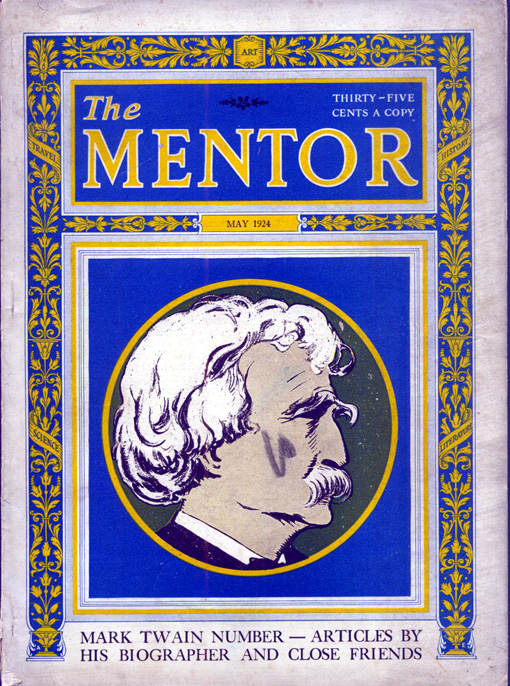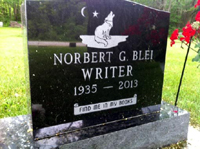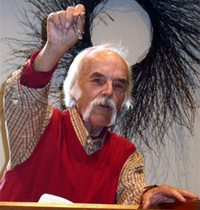
NOTES from the UNDERGROUND No. 211 | January 10, 2011
MARK TWAIN——-REVISED
by
Norbert Blei
“It is better to keep your mouth shut and appear stupid than to open it and remove all doubt.”—Mark Twain
If he’s not our greatest American writer, he’s certainly our most beloved. His legacy to American letters runs deep. Old Hem drew the line in the sand in his beautiful book, GREEN HILLS OF AFRICA (1935) when he stated in chapter one: “All modern American literature comes from one book by Mark Twain called Huckleberry Finn. If you read it you must stop where the Nigger Jim is stolen from the boys. That is the real end. The rest is cheating. But it’s the best book we’ve had. All American writing comes from that. There was nothing before. There’s been nothing as good since.”
Enter the academics of today, the ‘politically correct’ to revise our literary history. Make it safe. Twain dealt with enough stupidity of this sort in his own time and made a career of mocking it in talks and print, in a style uniquely his own. Tell it as it is (and have fun telling it).
Midwestern. American. Real.
(No bullshit.)
His defense rests—in all his works.
On the plus side of this new, revised edition of “Huckleberry Finn” that substitutes the word “slave” for “nigger” (edited by Prof. Alan Gribben for NewSouth Books, to be released in February) is that no school yet has expressed an interest in teaching it. On the minus side, the publisher’s comment that Barnes & Noble, Borders, and other bookstores have registered advanced orders—and that she was expecting orders from schools and libraries.
Here’s hoping the book bombs. Here’s hoping schools and libraries, especially, see the light of day: the truth of Twain.
Here’s hoping Prof. Gribben finds work editing romance novels.
If academia deems it necessary to protect our culture from Mark Twain, just imagine who? what? next.
And if a high school English teacher (who admires Twain) declines to teach “Huckleberry Finn”… “because it is too long” I suggest she relieve herself from the serious work of educating our youth.
Mr. Twain, I leave you the last word:
“The difference between the right word and the almost right word is the difference between lightning and the lightning bug.,”—Mark Twain
A recent, short, and best biography of Twain in a long time. Packed with pertinent information, reads like a novel. From: The Library of American Biography. Author, David W. Levy, Prentice Hall, 2010.
PUBLISHER TINKERS WITH TWAIN
by
Julie Bosman (with Tamar Lewin)
A new edition of “Adven¬tures of Huckleberry Finn” is missing something: the n-word.
In its place, 219 times throughout the book, is the word “slave,” a substitution that was made by NewSouth Books, a publisher based in Alabama, which plans to release the edition in February.
Alan Gribben, a professor of English at Auburn University at Montgomery, approached the publisher with the idea in July. Mr. Gribben said Tuesday that he had been teaching Mark Twain for decades and always hesitated before reading aloud the common racial epithet, which is used liberally throughout the book, a reflection of social attitudes in the mid-19th century.
“I found myself right out of graduate school at Berkeley not wanting to pronounce that word when I was teaching either ‘Huckleberry Finn’ or ‘Tom Sawyer’ ” he said. “And I don’t think I’m alone.”
Mr. Gribben, who combined “Huckleberry Finn” with “Tom Sawyer” in a single volume and also supplied an introduction, said he worried that “Huckleberry Finn” had fallen off reading lists, and wanted to offer an edition that is not for scholars, but for younger people and general readers.
“I’m by no means sanitizing Mark Twain,” Mr. Gribben said. “The sharp social critiques are in there. The humor is intact. I just had the idea to get us away from obsessing about this one word, and just let the stories stand alone.” (The book also substitutes “Indian” for “injun.”)
Since the publisher discussed plans for the book this week with Publishers Weekly, it has been “assaulted” with negative e-mails and phone calls, said Suzanne La Rosa, the co-founder and publisher of NewSouth Books.
“We didn’t undertake this lightly,” Ms. La Rosa said. “If our publication fosters good discussion about how language affects learning and certainly the nature of censorship, then difficult as it is likely to be, it’s a good thing.”
The news set off a storm of angry online commentary, scolding the publisher for “censorship” and “political correctness,” or simply for the perceived sin of altering the words of a literary icon. Twain admirers have turned his hefty “Autobiography of Mark Twain,” published last year, into a best seller.
An initial print run of 7,500 copies has been planned for the revised “Huckleberry Finn.” The print edition is scheduled for publication in February, and a digital edition could go on sale as early as next week.
Mr. Gribben said no schools had expressed interest yet in teaching the book — nor did he say what ages he thought the edition appropriate for. In his introduction, however, he writes that “even at the level of college and graduate school, students are capable of resenting textual encounters with this racial appellative.”
Ms. La Rosa said the publisher has had advance orders from Barnes & Noble, Borders and other bookstores, and she expected more orders from schools and libraries.
Some English teachers were less than thrilled about the idea of cleaning up a classic.
“I’m not offended by anything in ‘Huck Finn” said Elizabeth Absher, an English teacher at South Mountain High School in Arizona. “I am a big fan of Mark Twain, and I hear a lot worse in the hallway in front of my class.”
Ms. Absher teaches Twain short stories and makes “Huck Finn” available but does not teach it because it is too long — not because of the language.
“I think authors’ language should be left alone,” she said. “If it’s too offensive, it doesn’t belong in school, but if it expresses the way people felt about race or slavery in the context of their time, that’s something I’d talk about in teaching it.”
[from THE NEW YORK TIMES Jan. 5, 2011]
THAT’S NOT TWAIN
Next month, you will be able to buy the single-volume NewSouth Edition of Mark Twain’s “The Adventures of Tom Sawyer” and “Adventures of Huckleberry Finn,” edited by Professor Alan Gribben of Auburn University at Montgomery. It differs from other editions o those books because Mr. Gribben has turned the word “nigger” — as used by Tom and Huck — into “slave.” Mr. Gribben has also changed “Injun” to Indian, Mr. Gribben says he wants to make these American classics readable again — for young readers and for anyone who is hurt by the use of an epithet that would have been ubiquitous in Missouri in the 1830s and 1840s, which is when both books are set. He says he discovered how much Twain’s language offended readers when he began giving talks about “Tom Sawyer” all across Alabama in 2009. He has also acknowledged that what he calls “textual purists” will be horrified by his sanitized versions of the two classics.
We are horrified, and we think most readers, textual purists or not, will be horrified too. The trouble isn’t merely adulterating Twain’s text. It’s also adulterating social, economic and linguistic history. Substituting the word “slave” makes it sound as though all the offense lies in the “n-word” and has nothing to do with the institution of slavery. Worse, it suggests that understanding the truth of the past corrupts modern readers, when, in fact, this new edition is busy corrupting the past.
When “Huckleberry Finn” was published, Mark Twain appended a note on his effort to reproduce “painstakingly” the dialects in the book, including several backwoods dialects and “the Missouri negro dialect.” What makes “Huckleberry Finn” so important in American literature isn’t just the story, it’s the richness, the detail, the unprecedented accuracy of its spoken language. There is no way to “clean up” Twain without doing irreparable harm to the truth of his work. I
[from: The editorial page of The New York Times, January 6, 2011]






























































Recent Comments